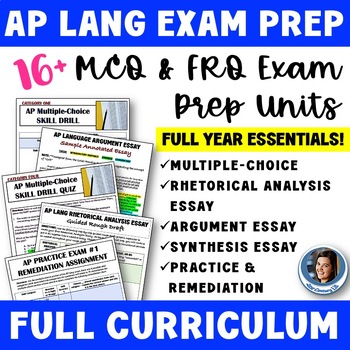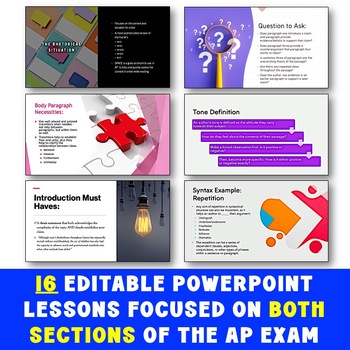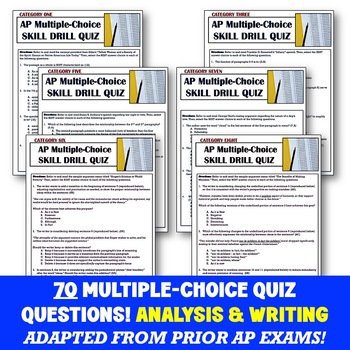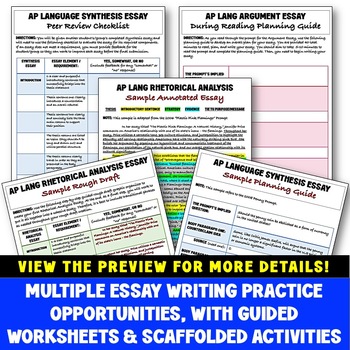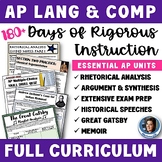AP Language Exam Prep Curriculum Essentials - Full Year AP Lang MCQ & FRQ Units
- Zip
Products in this Bundle (18)
showing 1-5 of 18 products
Also included in
- Looking for a comprehensive yearlong bundle of resources for AP Language and Composition? This full year AP Lang curriculum package contains 36 weeks of outlined instruction focused on rhetorical analysis, argumentative techniques, synthesizing information, historical connections, and extensive examPrice $134.99Original Price $228.40Save $93.41
Description
Together, these AP Language and Composition exam prep units provide you with yearlong materials to thoroughly teach students how to master all four AP Lang exam components: multiple-choice (rhetorical analysis and editing), synthesis essay writing, rhetorical analysis essay writing, and argument essay writing. Not only will students be thoroughly introduced to each segment of the AP exam through targeted lessons, but they will also have ample opportunities to practice, workshop, peer review, and remediate along the way.
Multiple-Choice Skill Drill Units Included (there are 8 total!): Each Unit focuses on one of the MCQ skill categories as outlined in College Board's CED for AP Lang:
MCQ Rhetorical Analysis Passage Skills:
- Skill Category One: Analyzing the rhetorical situation (speaker, purpose, audience, message, and exigence)
- Skill Category Three: Analyzing Elements of Argument (claim and thesis, evidence, absolute and qualified arguments, maximizing qualifiers, limiting qualifiers, counterarguments, rebuttals, and concessions)
- Skill Category Five: Analyzing Argumentative Methods (passage organization, line of reasoning, relationship between ideas and phrases, rhetorical strategies, form follows function)
- Skill Category Seven: Analyzing an author's Stylistic Choices (diction, words in context, tone, syntactical structures and patterns, grammar and mechanics)
MCQ Writing and Composition Passage Skills:
- Skill Category Two: Writing towards a specific rhetorical situation (speaker, purpose, audience, message, and exigence)
- Skill Category Four: Writing Claims and Evidence (thesis, sub-claims, evidence, sources, credibility, relevancy, qualified claims)
- Skill Category Six: Passage Organization and Writing Commentary (passage organization, line of reasoning, relationship between ideas and phrases, transitions)
- Skill Category Eight: Writing Effective Tones, Language, and Punctuation (neutral and academic tone, word choices, precision, effective clauses, grammar)
EACH Multiple-Choice Unit Contains:
- An Editable PPT Presentation Mini-Lesson: each presentation includes an introduction to the focus skill category, important concept and term definitions, detailed examples, and sample question stems students might see on their AP Exam (collected from prior AP Lang Exams)
- Guided Notes - to allow students to easily and quickly take notes on the information
- A PDF copy of the quiz passage (featuring authentic passages customized to mimic those on the AP exam)
- Authentic, AP-Style multiple-choice quiz questions (each quiz is focused on a particular skill category from above)
- A Reflection Activity - for students to work through their right and wrong answers, reflecting on the concepts they either mastered or failed to master
- A Remediation Activity - for students to correct their incorrect responses, citing evidence from the passage to support the BEST answer choice
- Answer Keys for the quizzes
- Sample Responses for the reflection and remediation activities
- The 4 Rhetorical Analysis Units ALSO contain Vocabulary Preparation Worksheets!
PLUS! Full-Length MCQ Practice Exam Remediation Charts:
- 3 customized exam remediation charts, 1 for each of the multiple-choice practice exams included in AP Classroom. Each chart includes:
- Question-by-question skill category breakdown - to help students understand which AP Language skill each question is asking them to implement
- A column for students to calculate their skill accuracy percentages - to help students identify their strengths and weaknesses on the multiple-choice portion of the exam
- A section for students to calculate their overall percentages for the two different type of multiple-choice questions on the exam: rhetorical analysis and composition / editing
- An exam reflection prompt that asks students to pick two of their weaknesses and explain, with evidence from the practice exam, why they typically struggle with these types of questions
- A Universal remediation chart (without any pre-filled question breakdowns) - to allow students to remediate ANY multiple-choice practice test of their choosing
- Teacher notes, suggested procedures, and a student chart example - to guide student learning and make your life easier
Essay Writing Units Included (There are 9 total - 3 Introduction Lessons, 3 Practice & Remediation Units, and 3 Toolkits for Struggling Writers):
EACH Introductory/Workshop Essay Writing Unit (one for each essay type) includes the following materials:
- An Editable Presentation that introduces students to the entire the essay writing process
- Prompt Specific Examples throughout the presentation - to guide learning and reflection
- An Original “6” Sample Essay - to model exemplary writing and essay strategies
- An “Analyzing a “6” Workshop Activity” that allows students to thoroughly evaluate the “6” essay
- An EDITABLE Rubric checklist created from the most recent guidelines established by College Board
- A Detailed Answer Key for the workshop activity
EACH Practice/Remediation Essay Writing Unit (one for each essay type) contains the following materials:
- A detailed Teacher's File, complete with lesson procedures, supplementary links, and scoring tips
- An Editable "Scoring Checklist" (Rubric) for the the essay prompt - to guide your grading and lessen your burden
- An Editable PowerPoint Remediation Presentation - to tackle student errors or misconceptions regarding the prompt tasks and to outline sophisticated writing strategies
- An authentic Sample "6" Essay - to model exemplary writing and rhetorical/argumentative strategies
- An annotated version of the Sample Essay for teaching purposes
- An Editable Graphic Organizer that prompts students to work with and deconstruct the sample essay
- An Answer Key for the Graphic Organizer to model best practice
EACH Exam Prep Toolkit for Struggling Writers (3 total: synthesis essay, rhetorical analysis essay, and argument essay) Includes:
- During Reading Essay Planning Guide - to help students plan an outline of each essay as they read through the prompts and associated texts provided
- Guided Rough Draft Graphic Organizer - to guide students through a step-by-step essay writing process once they have their plan in place
- Completed Planning Guide and Rough Draft Samples - to help students meet expectations and to provide an exemplar for them to follow
- Full-Length Exemplar Essay Handout - for students to annotate and use as a model while they write their own essay
- An Annotated Version of the Full-Length Essay - to guide student work and aid in your facilitation of an optional in-class annotation activity
- Small Group Essay Activity and Sign-Up Sheet - to encourage student engagement, collaboration, and peer learning
- Peer Review Essay Checklist - to promote peer editing and feedback, and to ease your grading burden
- AP-Inspired Essay Mastery Rubric - adapted from College Board essay requirements
Implement these rigorous AP Language and Composition MCQ and FRQ Exam Prep units throughout the year to easily engage students in multiple standards-based lessons and activities that will hone their learning, target their strengths and weaknesses, and improve their ability to master the AP Exam at the end of the year!
Keywords: AP Lang, AP Comp, AP Lang and Comp, Pre-AP Lang, AP Language and Composition, relationship between claims and evidence, relationship between paragraphs, counterclaim, concession, AP multiple-choice passages, assessments, quizzes, assessment, test preparation, exam preparation, AP boot camp, section one, skill category two, 2.A, 2.B, editing argument essays, writing argument essays, 4.A, 4.B, 4.C, 6.A, 6.B, 6.C, 8.A, 8.B, 8.C, the rhetorical situation, SPACE, context, occasion, SOAPS, tone, form follows function, line of reasoning, grammar and mechanics, syntax, syntactical choices, style, repetition, periodic sentences, interrogative sentences, author's attitude, declarative intent, tone list, popular AP tone words, tone shift, skill category three, 3.A, 3.B, 3.C, Franklin D. Roosevelt, analyzing speeches, analyzing informational text, 1.A, 1.B, 5.A, 5.B, 5.C, 7.A, 7.B, 7.C, synthesis essay, argumentative essay, argument appeals, argumentative writing, AP sample essay, research skills, in-text citations, writing skills, essay, FRQ's, free response, AP exam strategies, rhetorical devices analysis, writing workshop, rhetorical devices, rhetorical strategies, rhetorical appeals, ethos, pathos, logos, practice, remediation, writing process, rough draft, peer review, revisions, editing, final draft

